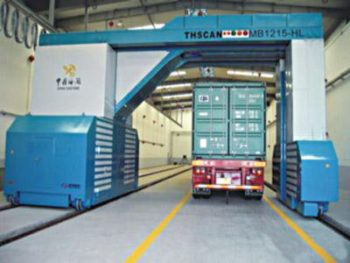As the Nigeria Customs Service (NCS) abandons most of the scanners it inherited from former service providers, a frontline licensed customs agent, Olumide Fakanlu has given an insight into what might be termed the biggest error in the destination inspection regime.
In a chat with SHIPS & PORTS DAILY at his Apapa office, the ANLCA Apapa Chapter Chairman said the location of the scanners in the first place was the system’s biggest undoing.
While cautiously disassociating from insinuations that the scanners were below international standard, Fakanlu said the DI was not properly articulated right from the beginning.
He said, “From the onset, we have been having the problem of scanning facilities because the scanners are not located in the right places.
“We heard reports that the scanners were substandard, I cannot confirm that, but we all know the destination inspection facilities were not well articulated in the beginning.
“What we learnt was that the scanners have to be located by the seaside where, as containers are being discharged from the vessel, they are scanned and reports kept for Customs action.
“But what we had was that the containers had to be stacked first before you can now go for the scanning. Then, it was a big problem until we resolve within ourselves to find the solution, which was logistics and the terminal operators provided that.”
Fakanlu said terminal operators are doing a lot to facilitate release of cargo from the port with regard to scanning of containers.
“Now if your container falls in the category that needs scanning, you will book for scanning and the operator will scan it and send report to Customs for further action. So, since that time, we have not been having much problems, but the other issue there is that these scanners are getting older or they are not being maintained,” he added.
On the issue of having access to the port by clearing agents, Fakanlu said the agents have high hope on the Managing Director of Nigerian Ports Authority (NPA), Hajia Hadiza Bala Usman, who has directed full implementation of the authority’s biometric identification cards for the agents to be able to have unhindered access to the port.
He however appealed to NPA to allow members with ANLCA biometric identity to have access to the ports to perform their duty while it works own its own biometrics project.
“The woman is a person of substance, so we want to believe her and be open. It is not something that can be done in a day. She had heard us and she will go back and address the problem.
“This particular problem takes human efforts to solve. It is about people, it is about how to get a good team that will manage that system. We will give them enough time.
“NPA being the landlord said they want to do their own identification card or that they are giving us their own identity card. That is what they are doing now and we cannot blame them, but we are pleading with them to accept the ANLCA biometrics because it is authentic and qualified for that purpose too,” he said.

